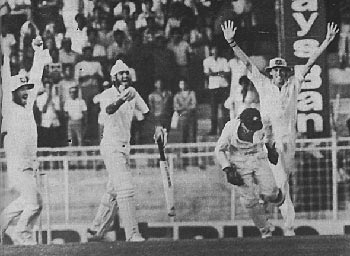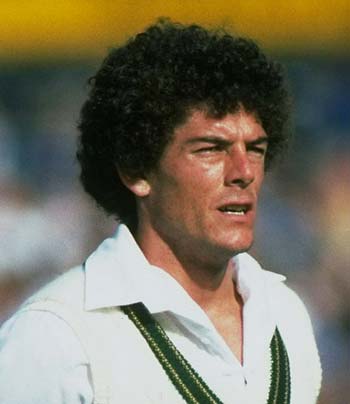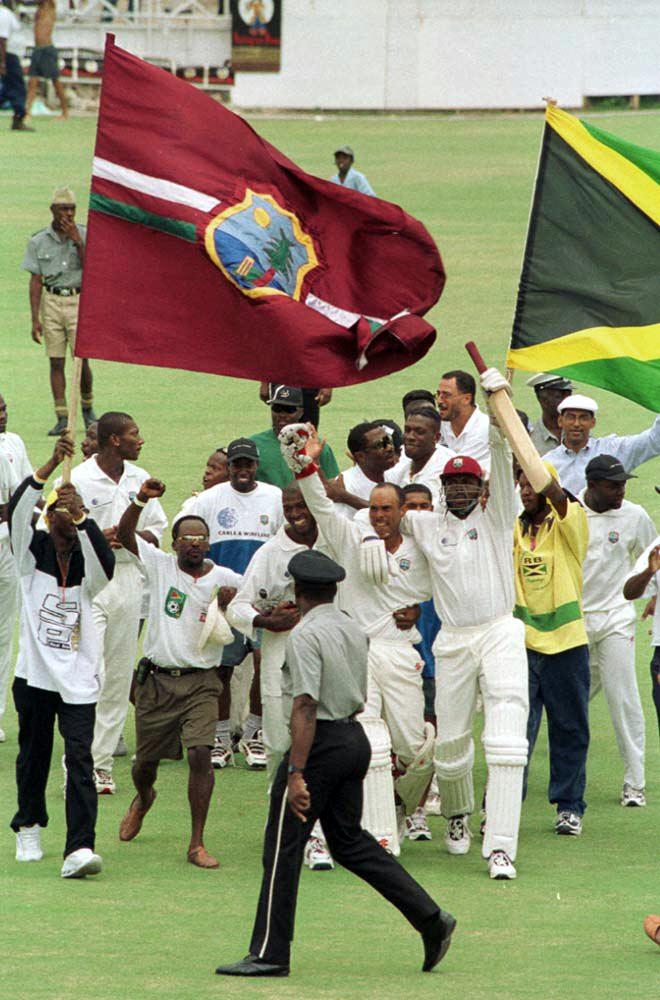The recent epics at Edgbaston and Old Trafford will feature prominently in any catalogue of Ashes classics in the years to come. In the wake of two such gripping contests, we asked several of our correspondents to name the greatest matches that they had witnessed, or would have liked to. Some of the choices, like Botham's Headingley heroics and the second Tied Test, are familiar to most, but nearly forgotten gems like Adelaide 1960-61 and Boxing Day 1987 also make up a list that dates as far back as 1894-95. History reprises itself, and seldom more thrillingly than on a cricket field.

|

Maninder protests, but the game's a tie!
© Getty Images
|
|
This wasn't the beautiful Test; in fact it was ugly. Dean Jones puked, pissed and nearly killed himself on his way to a double-hundred. I had read about Brian Close and seen Mohinder Amarnath take some nasty knocks, but this was, by a distance, the bravest thing on a cricket field I have seen. Kapil Dev scored one of his finest and most meaningful Test hundreds to help India avoid the follow-on and India scored 397 runs in what will count these days as four overs more than a day's play.
Allan Border then made a courageous declaration by setting India 348 runs on the last day. Not many backed India to go for the runs, but they did, with Sunil Gavaskar playing beautifully. But his dismissal for 90 left the match in the balance. The last 35 overs became a roller-coaster ride because runs kept coming and wickets kept falling. It was fifth-day Test cricket at its unpredictable best.
Cricket fans will forever debate Ravi Shastri¹s decision to take a single in the last over that equalled the score and Vikram¹s Raju's lbw decision that tied the Test, but with hindsight, it was the prefect result. I watched the last day in the hostel canteen. There were about 50 of us and it turned out to be the longest lunch of our lives. The end left us drained, numb and exhilarated. It could have been a great win for India, but we had seen history being made.
Who says cricket needs to be a contest between bat and ball? This was the match that had it all, at least in the eyes of one impressionable 11-year-old. Gooch's 333 was the Leviathan that towered above all other contributions, but the picture would not be complete without due recognition for a host of worthy support acts, two of which in particular would have graced any Test in history.
Mohammad Azharuddin's impossibly wristy century, conjured from 87 balls with a defiant wand for a willow, was matched by Kapil Dev's impossibly cool demolition job on Eddie Hemmings. Four consecutive sixes into the building site at the Nursery End, and I at last understood what it meant to "save the follow-on". Throw in a stunning one-handed outfield catch from the 17-year-old Sachin Tendulkar, and eight economical wickets for Angus Fraser, and cricket had me hooked - in much the same manner as Edgbaston 2005 will have hooked a new generation.
The drama of Test cricket is cumulative rather than instantaneous. The tension that gripped us on the last morning at Edgbaston did not just concern the task at hand; it was an outgrowing of the three preceding days. Perhaps the first match to reveal this quality in cricket was the Sydney Test of December 1894, which was resplendent with runs until the final, sixth, morning.
Australia won a good toss on Sydney's new Bulli pitch and piled up 586, with local hero Syd Gregory's four-hour 201 the linchpin. When England's reply was kept to 325, the follow-on was enforced: something usually lethal in a timeless Test. But without haste, panic or even dismay, England batted 181.4 overs for 437 in their second innings, Albert Ward adding 117 to his first-innings 75, and everyone selling themselves dearly.
On the evening of the fifth day, Australia's captain John Blackham suffered a sleepless night listening to the rain fall on his hotel roof, and prowled the dressing room nervously as if to live up to his nickname 'The Caged Lion'. Australia's second innings waxed at 2-130, then Bobby Peel, apparently sobered up by his captain, swept them aside with 6-67.
Australia's last eight wickets mustered only 36, and game of 1514 runs ended up being decided by 10 of them. No team turned a follow-on around again until Headingley '81.
There can have been few greater performances in a losing side than George Giffen's 161, 41 and 8-239 from 118 overs. There are some other reasons to mark this game as the first modern Test. It was the first followed as it was happening on a daily basis in England, the
Pall Mall Gazette taking advantage of the new submarine cable linking Australia and England. As if to mark the historical transition, Blackham, the last survivor of the inaugural Test match, did not play again; nor did Charlie Turner. And on the last day was born, in the Victorian country town of Jeparit, one Robert Gordon Menzies. He would be Australia's
longest-serving and most cricket-crazy prime minister.

|

Mike Whitney's obduracy, and luck, made him a TV star
© Getty Images
|
|
It was a Test that had everything. It was the series when New Zealand revealed the last of its great truly gritty No 3's, Andrew Jones. We lost in Brisbane and Jones was maligned for his technique. His 150 and 64 in Adelaide were an emphatic reply. On to Melbourne where New Zealand batted first and Jones was soon in the action again: "caught" down the leg side by Greg "The Liar" Dyer for 40-odd. John Wright fell for 99. Australia came and went - can't recall what they scored or who got them - and in New Zealand's second dig, Martin Crowe passed 4000 runs in the calendar year, with what media reports of the time called some of the finest batting ever witnessed.
However, New Zealand posted only a moderate target which, at tea on the final day, Australia seemingly had under control. That was until Dipak Patel took a brilliant catch at point to dismiss Mike Veletta. Then, the wheels fell off as Richard Hadlee zeroed in on Ian Botham's world record. He was level on 383 Test wickets when Mike Whitney joined Craig McDermott at the crease with just one wicket left. An 11-over spell was too much in the end for Hadlee: he would have to wait until Bangalore the following year to claim the record.
Danny Morrison thought though, as did thousands glued to their boxes across the Tasman, that he had McDermott plumb LBW but umpire French disagreed. It was the longest six overs of Whitney's life but an episode that made him a TV star.
The 1960-61 Tied Test is an obvious choice, but the result of that game was confusing for the players and spectators even after it finished. Three matches later in Adelaide, with the series locked at 1-1, there was no doubt about the scenario - Hall, Sobers, Worrell and Co. wanted one wicket while Australia were 252 runs behind with 109 minutes until stumps. Ken Mackay and Lindsay Kline, a genuine No. 11 who was told "it's a waste of time sending you in" by a woman in the crowd, took only two byes in the final ten overs before Mackay let the final thunderbolt from Hall crash under his ribs to avoid any danger of dismissal.
The draw became a 2-1 series victory in the next Test, but West Indies gained revenge 32 years later at the same ground, when Courtney Walsh ended the 40-run stand of Craig McDermott and Tim May to seal a one-run win. One from a book and one heard on radio, they are difficult to split.
The match had been a slow-burner all the way through and the quality wasn't outstanding on either side; Wasim and Waqar had looked as much spent reincarnations of their nineties selves as had the other great fast-bowling pair of the decade, Ambrose and Walsh. Brian Lara wasn't playing, Shoaib Akhtar was injured and the smell of match-fixing hung thick in the air.
Greatness came in its conclusion. No one will ever know how Courtney Walsh managed to bat out 72 minutes and 24 balls to help Jimmy Adams, the captain, steal an incredible one-wicket win. Walsh had come out on the final afternoon with 19 still needed and got through with assistance from Billy Doctrove - one edge to the 'keeper was missed, as was a bat-pad - and Pakistani fielders, who botched it twice when both batsmen were stranded at the striker's end and they only had to catch a throw and pick off a bail.
And there was greatness too in Adams' defiance - he took a blow on the chin that needed stitches on the field during his match-winning, boundary-free, unbeaten 48. Finally, in Akram's last real hurrah, there was true genius. Having gorged on his on-field exploits like you would a drug in the `90s, I suffered withdrawal as Akram became enmeshed first in domestic strife and then in global, darker scandals off the field in the latter half of the decade.
Cynically, I had expected this tour to confirm to me that he was finished; he defied match-fixing, diabetes, age, poor form, team disputes and me, taking 11 wickets, upping his pace, rediscovering the swerve of his reverse swing and single-handedly dragging Pakistan to within a dodgy Doctrove decision of a first series win in the Caribbean.

|

West Indies whoop it after defying the magnificent Akram
© Getty Images
|
|
While Edgbaston `05 can boast rollicking entertainment from ball one, it did not have the fundamental turnaround of Headingley `81 when England were down and out in the match and the series. Defeat would have left them 2-0 down with three to play. Victory turned the series around and cemented the legend of Ian Botham, who became for a time the most celebrated sportsman in Britain. He has remained the most famous cricketer in England until the recent events of the current Ashes series, which might lay to rest the ghost of Botham's Ashes.
The first two days of the Test were dour, Australia grinding out 401 for nine declared and then making England follow on. The infamous bet placed by Rod Marsh and Dennis Lillee when the odds against England were 500-1 in mid-match only adds to the folklore of this extraordinary Test.
There was Botham's devil-may-care batting, Bob Willis' mad-staring-eyes pace bowling and then there was Mike Brearley, the England captain who never made a Test hundred but has Demigod status. Botham certainly worshipped him and Brearley's presence undoubtedly enabled Botham to forget the torment of his own captaincy period and set the cricket world alight once again.
Steve Waugh's juggernaut had ground to an improbable halt three days earlier in scenes of pandemonium at the Eden Gardens, but when Matt The Bat Hayden pounded a superb century on the opening day, it appeared to be back to business as usual. Crucially, it was Waugh - the cricketer responsible for more defining moments than any other in the modern era - that gave India a sniff, handling the ball to trigger a slide from 340 for 3 to 391 all out.
India's top order all chipped in, with Tendulkar imperious on his way to 126, and Australia's openers strode out facing a deficit of 110. But yet again, Harbhajan Singh would be the whirling dervish of their worst nightmares, as India were set a modest target. While Laxman was batting like a dream, it appeared oh-so-easy, but his grace was counterbalanced by Jason Gillespie bowling one of the finest spells ever seen on Indian soil.
As the decibel level rose, India stuttered once, twice, and again. The unheralded, and soon to be discarded, Sameer Dighe was the unlikeliest of heroes, and when Harbhajan squeezed the winning run past point, millions of voices roared in unison across a vast country. Up in the then-open-air press box, you couldn't hear your neighbour speak, not that anyone cared. It was, and will forever remain, Indian cricket's finest hour.





